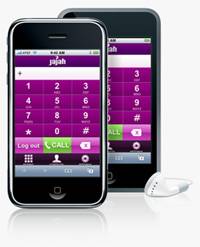Moconews posed an interesting question this morning: will wifi go the way of the public phone booth? Their premise was that public wifi (i.e., at conferences, or busy coffee shops) is often slow and hard to use, while mobile broadband is more reliable. Further, mobile broadband is spreading like wildfire and becoming more ubiquitous. As that happens, is wifi in danger of becoming no longer useful?

There’s no question that wifi is great for certain things. For a home network, it can’t be beat. But for larger scale deployments, such as at conference, it can be slow and maddening to use. While I love the coffee shop atmosphere, most days I generally work from home because I can’t take the slow speeds on coffee shop wifi for more than an hour.
There’s also a problem of congestion. In densely populated areas, as more and more people set up home networks, throughput is dropping as the airwaves get cluttered. David Heinemeier Hansson posted today about noise on his urban wifi connection, and judging from the comments his post received, it’s a common problem. The solution? Perhaps mobile broadband.
Moconews pointed to Ericssons marketing chief Johan Bergendahl, who said mobile broadband will supplant wifi hotspots as the preferred method of on-the-go web access. “Hotspots at places like Starbucks are becoming the telephone boxes of the broadband era,” he said. Moconews also pointed to a report that mobile broadband uptake is on the rise, and another report that city-wide wifi deployments are also growing — perhaps indicating that wifi isn’t ready to go away yet.
But let’s just suppose that mobile broadband does become the dominant method of connecting to the Internet. Let’s pretend that high cost, limited service territories, and speed barriers are overcome. What would the result be?

Perhaps the most interesting result would be that cellular voice networks would be forced to give way to VoIP, and services like Skype or JAJAH might be well positioned for a mobile broadband dominated world. With fast, reliable, and ubiquitous mobile broadband access, cellular voice plans would be irrelevant given cheaper VoIP options. We’ve already seen some voice-over-IP services target mobile users, such as JAJAH’s iPhone optimized version.
That would be mean less costs for consumers — no more free public wifi (presumably), but a slimmer cell phone bill and a single broadband connection that could cover mobile phone, web access, and landline telephone. Throw in a VoIP television service like Joost (which is starting to test live streaming this month) or Livestation, and the future might be one connection that covers all of your media and communication needs.
That simple future is a ways off, though. Mobile broadband isn’t cheap, it isn’t as fast as wired broadband, and it doesn’t have the coverage necessary to be a truly reliable alternative to wifi hotspots (let alone voice networks). But is that future coming? Probably. HSPA+, which may arrive late this year, will offer speeds of up to 42 Mbps down and 11 Mbps up, which is significantly faster than my 20/2 Mbps cable line, and astronomically faster than the iPhone’s current EDGE network (which is around 240 kbps down).
There are a lot of barriers to overcome — not least of which, how to handle billing consumers when roaming on other networks and how to make the various competing standards play nice (or get networks to conform to a single standard). But once those issues are solved, fast, cheap, ubiquitous mobile broadband may be on the horizon.
When do you think mobile broadband will be fast enough, cheap enough, and ubiquitous enough to supplant wifi? Will that ever happen? If it does, what other side effects will we see? Let us know your thoughts in the comments below.

















